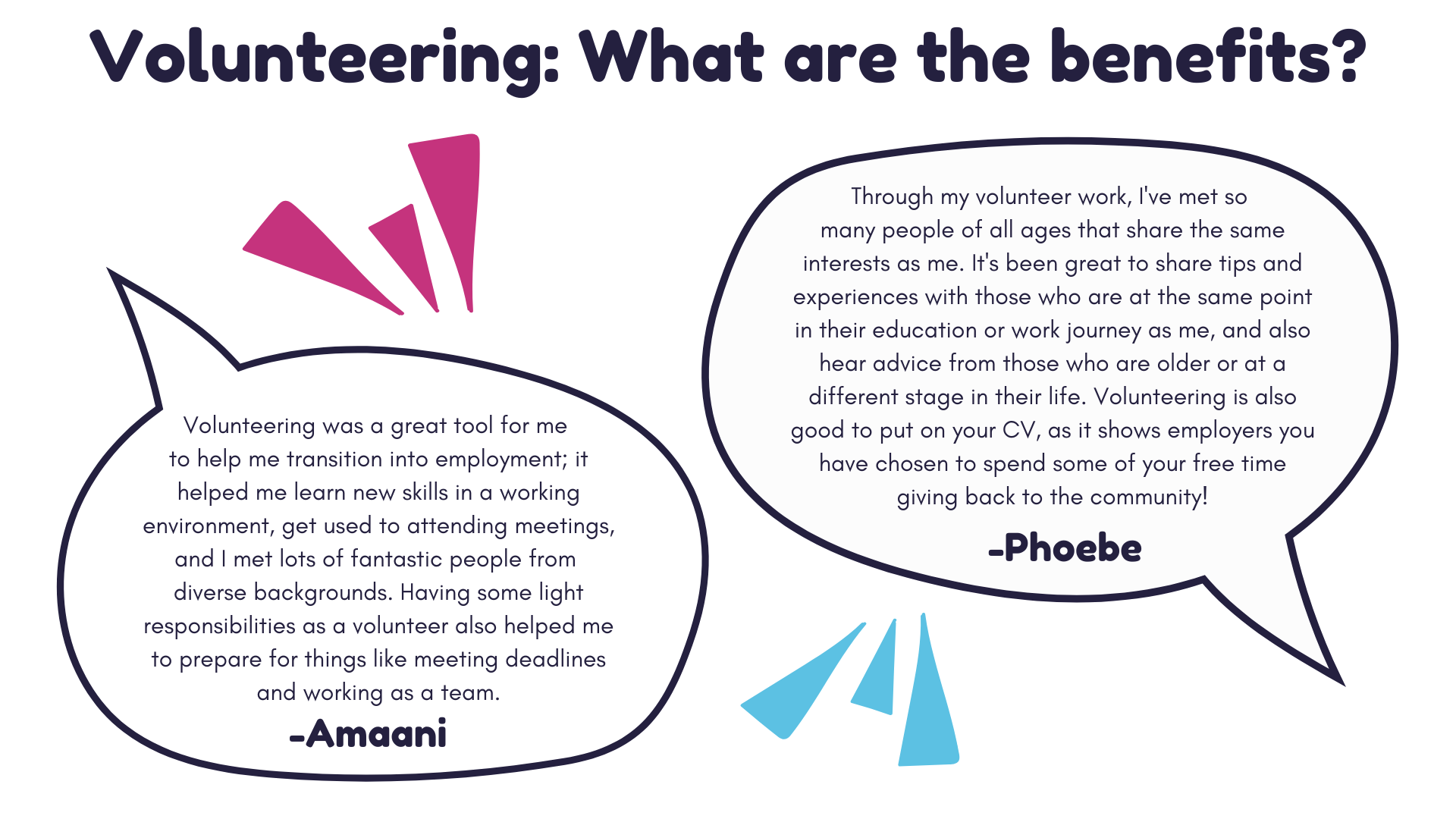Entering the Working World
Moving from education to employment
Entering the working world can feel scary, especially if you're not sure where to start, and that's OK!
Scroll down to learn more about finding work after leaving education, find tips for managing your wellbeing during this time, and hear from e-wellbeing Youth Ambassadors about their own experiences.

Hear from other young people about their own experiences!
Many of us experience leaving school, college, or university and feeling unsure about what to do next. There's no right or wrong way to enter the working world; the most important thing is doing what feels right for you!
Watch the below video to hear from e-wellbeing Youth Ambassadors about their experiences of starting work, such as what they found helpful from employers and tips for looking after your mental health.


What type of work is best for me?
Before you start applying for jobs, it's a good idea to consider what type of roles would suit your needs. There are lots of different types of work available, and some common types are:
Full-time work - this involves working more than 35 hours a week (for example, Monday-Friday, 9am to 5.30pm including an hour break). This will usually involve an agreed salary, that you receive as monthly pay.
Part-time work - this involves working less than 35 hours a week (for example, working Monday-Wednesday 9am-5pm including a half hour break). This will usually involve an agreed salary, that you receive as monthly pay.
Read on for more types of work and what these involve!
Freelance work - this involves working different hours, depending on the projects you have chosen to do. Freelance work is often more flexible than full-time or part-time work, but can mean you don't receive regular pay. This will usually involve you having an agreed hourly rate (e.g. £20 an hour) and this being paid per project, rather than each month.
Apprenticeship - this involves a mix of practical training in a job alongside experienced professionals, as well as studying for a qualification. These can take between 1-5 years to complete, depending on the role. Once the apprenticeship is completed, it is likely you will be qualified to apply for more experienced roles within that industry.
Volunteering - this involves learning practical skills within an organisation (for example, a charity) without being paid. This usually involves a flexible schedule, and you can choose how many hours you do. Volunteering can sometimes lead to a paid job, depending on the type of role and organisation.


Interested in youth mental health and wellbeing?
If you're passionate about improving young people's mental health and are looking for volunteer opportunities, you can sign up to join the e-wellbeing Youth Ambassador team. To find out more, click here!

Tips and advice for entering the working world
There are lots of different options for how you take your next steps after leaving education, and it's important to do what feels right for you.
Read on to find tips from e-wellbeing Youth Ambassadors about what to look for when applying for jobs, and how to find a role that suits your needs.


Getting Started
When you first decide to look for a job, it's OK if you don't know where to start. There's lots of different routes into employment, and types of jobs you can do, so it's important to focus on what feels best for you!
Scroll down to hear tips from e-wellbeing Youth Ambassadors about getting started with applying for work.
Phoebe's tips for before you apply:
- Have a browse around and see what your interests are, if you don't already know this
- Explore different job titles and what they mean, and the setting they are based in (e.g. working in an office or from home)
- When you find a job advert, look at the company's official website and check out their values
- Check the job role description carefully to make sure you know what will be expected of you if you get the job
- If you get an interview, do some preparation beforehand. If you have questions, ask these before or during your interview - there's no such thing as too many questions, so ask away!

"If you have additional support needs, it's important to let the employer know.
You can ask them about this in an interview, so you know if the job aligns with your needs and routine. A good employer will work with you to support you in the best way they can!
A good start can be letting them know the things you may need, for example step-free access to the office, or a quiet working environment to avoid sensory overload. You can let them know what currently works for you in your everyday life (or perhaps what you found helpful while you were still in education), so they can ensure you feel supported in the workplace as well."
- Phoebe

Amaani's tips for before you apply:
I think it's important to research what type of work would suit you best. For example, some jobs would involve working from home, while others will require you to work in a shared space, such as an office, a school, or a shop.
It's also important to find out what the working hours will be; some jobs will have fixed working hours (e.g. starting at 9am and finishing at 5.30pm each day), whereas others will require you to work different times (these are usually called shifts).
Another tip is to think about what you fundamentally care about; having this to motivate you will help to guide you in your career. For example, I really care about mental health and wellbeing, so I now work in a Special Needs department in a school!
Adapting to your new role
Once you've chosen your type of role and found a job that suits you, it's important to make sure you feel supported and comfortable within your new environment.
Read on to hear more from e-wellbeing Youth Ambassadors about their experiences of settling into a new working routine, and how to reach out for support.


Managing your routine
"I found that having a work diary has been really helpful for me. This way, I have been able to keep track of important dates and meetings that are coming up, so I can plan in advance. My diary is also where I make my daily 'to-do' list, which helps me organise my day.
Nowadays, most work systems are digital (for example, calendars on a phone or linked to an email); however, I've found having a paper diary is more useful for me, because I feel like my brain processes things better when I write them with a physical pen!"
- Amaani
Having a work/life balance
"In terms of transitioning from education to work (especially for shift work, which is what I do) I found it really beneficial to keep my calendar updated so I could add my shifts and know when I was working, or when I had time off. This allows me to make plans with my family or friends, and helps me maintain a social life outside of work.
I also think it's important to keep work as work, and have my own life outside of that. I make sure I make time to do things for myself, such as meeting up with friends, reading, or doing a hobby I enjoy!
- Phoebe


Phoebe's tips for feeling supported while moving from education to work:
"Reaching out for support is really helpful because there will always be someone there to support you. When I was finishing university, I had lots of meetings with the university's Career Advisors, who helped me to explore my interest and understand the kind of jobs I might like. They also helped me to fill out a post-graduate Personal Statement!
Asking other people for support will most likely benefit you, because people will be able to share their experience and knowledge. If they have already got experience of applying for job or starting in a new workplace, they can give you tips and advice that may be helpful for you.
Amaani's tips for feeling supported in the workplace:
"When you start working, it's totally normal to have lots of questions, and asking these questions will help you learn. It's better to reach out and get the support you need, rather than letting things build up. You'll be able to seek support from a variety of people in the workplace, such as your line manager, supervisor, colleagues, Occupational Health, and Human Resources (HR).
Employers are required to make adjustments for people who need additional support. This can include adjusting your working hours or workload, or providing more support with admin tasks. I find that having a weekly meeting with my supervisor helps me to manage work-related anxieties and gives me space to reflect."


Get Help
If you're struggling with leaving education and taking your next steps, you are not alone and support is out there. You may want to speak to a trusted adult, or you can find help in your local area by clicking below.
Click here to find mental health support services in your area.


